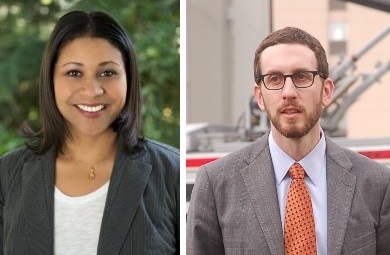Some pretty specious rationales are being used to peddle some pretty terrible recent transportation policy decisions in San Francisco. Yesterday, the SFMTA Board of Directors repealed Sunday parking metering, caving to pressure from Mayor Ed Lee. Board members said they bought into the mayor's thinking that bringing back free Sunday parking would help win support for transportation funding measures on the November ballot.
We've explained why the mayor's claims of an anti-meter popular backlash are unfounded, as the real push appeared to come from church leaders. But at City Hall, this faulty strategy of backtracking on solid efforts to improve transit and street safety seems to be popular among among decision-makers besides the mayor. In another recent case of the city watering down a great project, the SFMTA downsized transit bulb-outs in the Inner Sunset to preserve parking for a vocal minority who complained. Supervisor London Breed basically said that tip-toeing around the parking-first contingent is necessary to ensure that voters approve new funding for transit improvements down the line.
"They're pandering to a specific group of motorists -- the loudest opponents -- who are never going to support these programs," said Jason Henderson, author of "Street Fight: The Politics of Mobility in San Francisco."

At a supervisors committee meeting last week on the SFMTA's budget, which relies heavily on the ballot measures to fund planned transit and safety improvements, Breed said she's "trying to understand how we're going to convince voters, especially drivers, to spend a lot of money."
Breed said that while city officials like her might understand the connection between making walking, biking, and transit more attractive and cutting congestion and parking demand, many voters may not be so savvy. "We're asking drivers to basically foot the bill for all of the improvements, and we're taking away parking spaces, making things a lot more -- what drivers believe, and have expressed in my district -- more difficult," Breed told SFMTA Director Ed Reiskin.
Breed also said she was concerned that the city doesn't have a plan B for funding the Bicycle Strategy, the WalkFirst pedestrian strategy upgrades, and the Muni Transit Effectiveness Project. The three ballot measures would fund about half of the bicycle and pedestrian improvements called for, and most of the Muni TEP. "It sounds like we're taking it for granted that this is actually going to pass," said Breed.
The three ballot measures proposed by the Mayor's Transportation 2030 Task Force would each raise roughly $1 billion over the next 15 years. One measure calls for two $500 million general obligation bonds, one in November 2014 and another in November 2024. Another measure would raise the sales tax by half a cent. Only one measure would collect revenue specifically from car owners: an increase in the vehicle license fee from 0.65 percent to 2 percent, which simply restores the VLF to its level before 2004, when then-Governor Arnold Schwarzenegger cut it to 0.65 percent statewide. A state bill passed in 2012 specifically allowed San Francisco to raise it again with voter approval.
Responding to Breed, Supervisor Scott Wiener argued that motorists have already been given plenty of breaks, like the lower VLF and a federal gas tax that inflation has eroded since 1993, and already don't pay for the full cost of the infrastructure they use. "I think it's completely reasonable to say that drivers should bear part of the burden," said Wiener, noting that he's a car owner himself. "Right now, it's transit riders that are bearing the burden by having an unreliable system."
Breed said that Wiener is "preaching to the choir." She continued, "it's our responsibility as leaders to look at the bigger picture, and to project out what the challenges are... If I'm asking folks in my community to support [measures to raise more money], I want to feel confident about how we're using our existing dollars in our transportation system."
"While it's true that San Francisco government is no paragon of efficiency," said Livable City Executive Director Tom Radulovich, "it's also true that you can't run a city without revenue, which means taxes and fees for service. Roadways and public parking spaces are very costly public services - in monetary terms, as well as in sustainability and livability terms. The folks who use them ought to help pay for them."
Henderson and Radulovich say that like those who expect the city to be an autopia abundant with free or cheap parking, there's no placating those who "expect excellent public services but refuse to pay for it," as Radulovich put it.
Radulovich also noted that there's somewhat of a "false dichotomy" between easily-accessible parking and livability, as SFpark's efforts to put a rational price on parking further both goals.
Many sustainable transportation advocates say back-channel, retrograde concessions to parking complaints, like the Sunday meter repeal, undermine their political confidence in the SFMTA's ability to deliver needed safety and efficiency improvements. Just as officials like Breed feel cars-first voters need assurance, those San Franciscans who are eager for progressive change also have a political voice that can't be neglected.
Henderson pointed out that opponents often come around to improvements once they see them actually happen and that the sky doesn't fall. He pointed to the case of a sidewalk extension at Market and Dolores Streets that replaced several parking spaces and part of a traffic lane. Some of the most ardent opponents are now fans of the mini plaza outside the new condo building and Whole Foods Market, he said.
Henderson said there are also plenty of San Franciscans who own cars but "also understand that they shouldn't be used as much, and are open to reducing driving."
"I know a lot of those people. They see the problem as not funding walking, bicycling, and transit enough."




